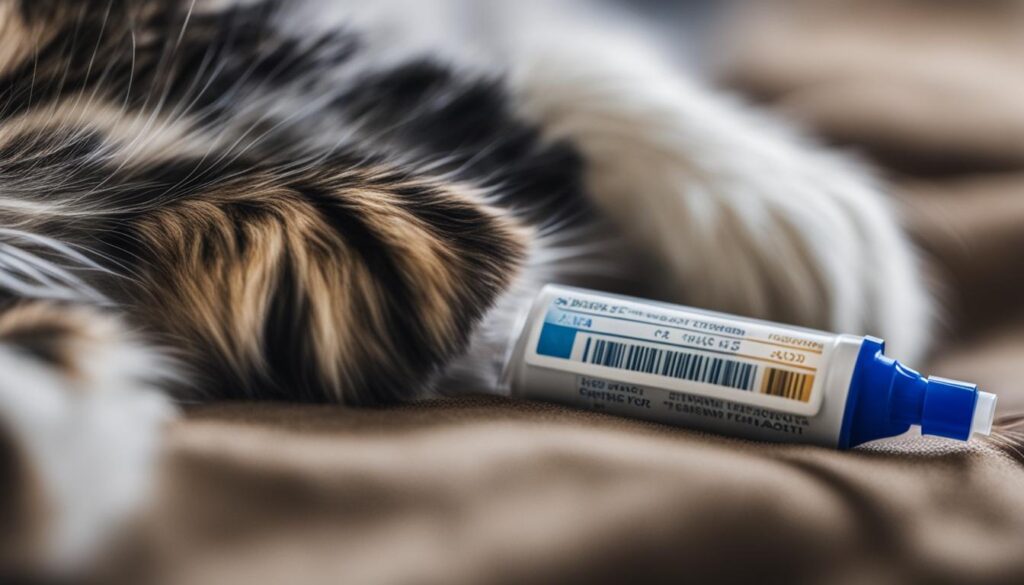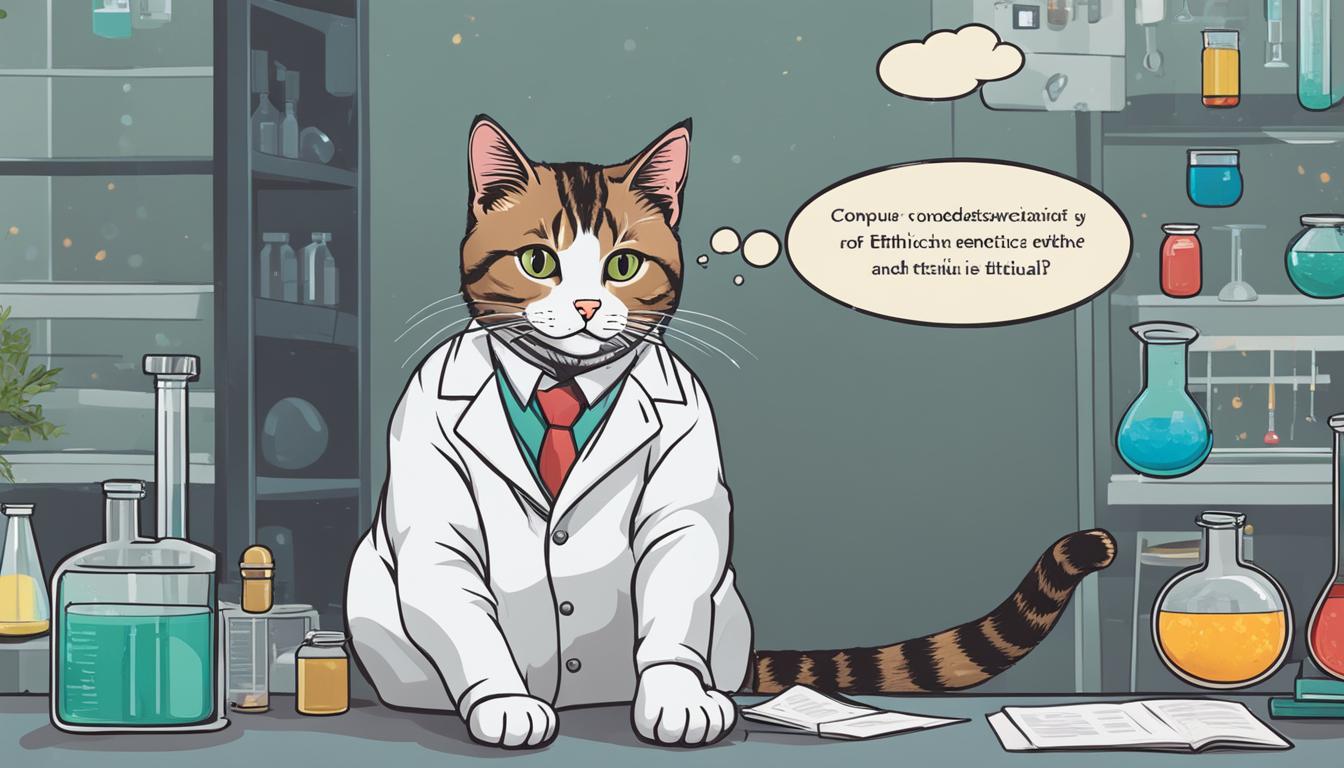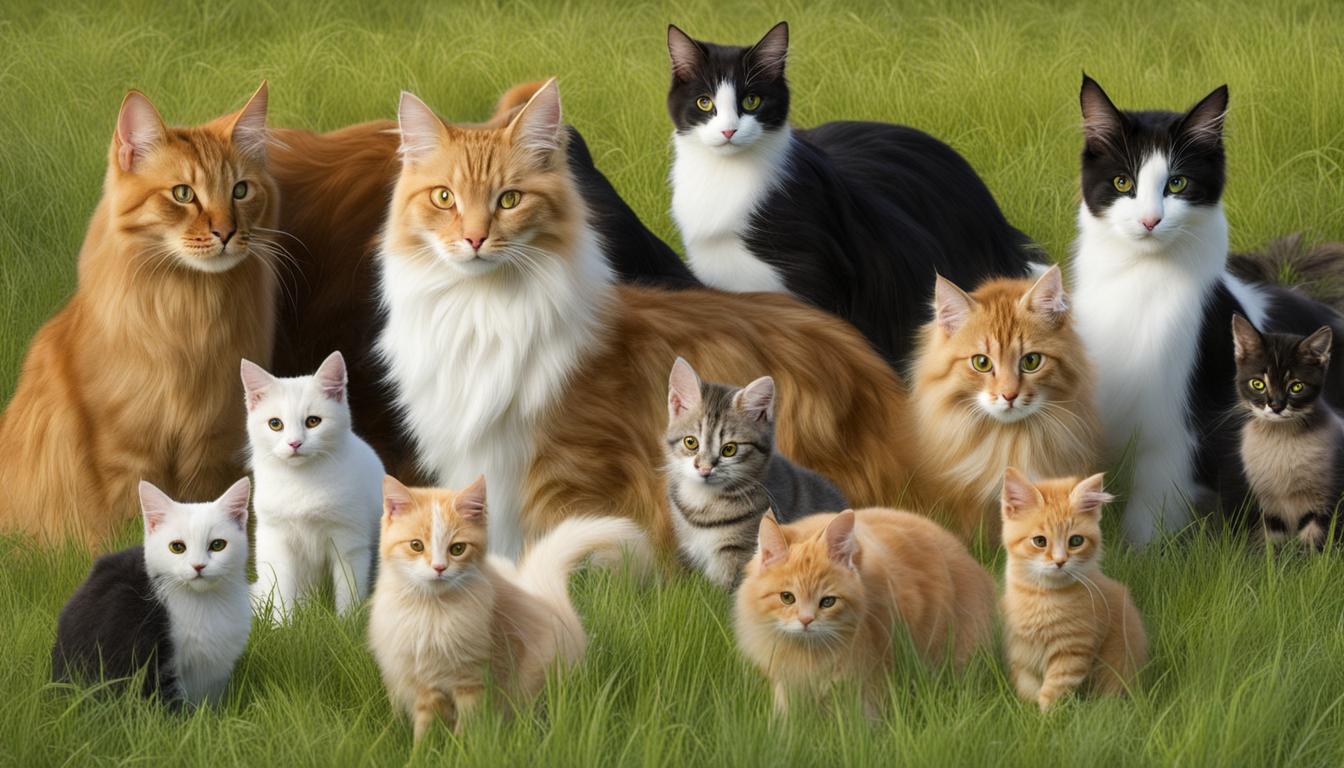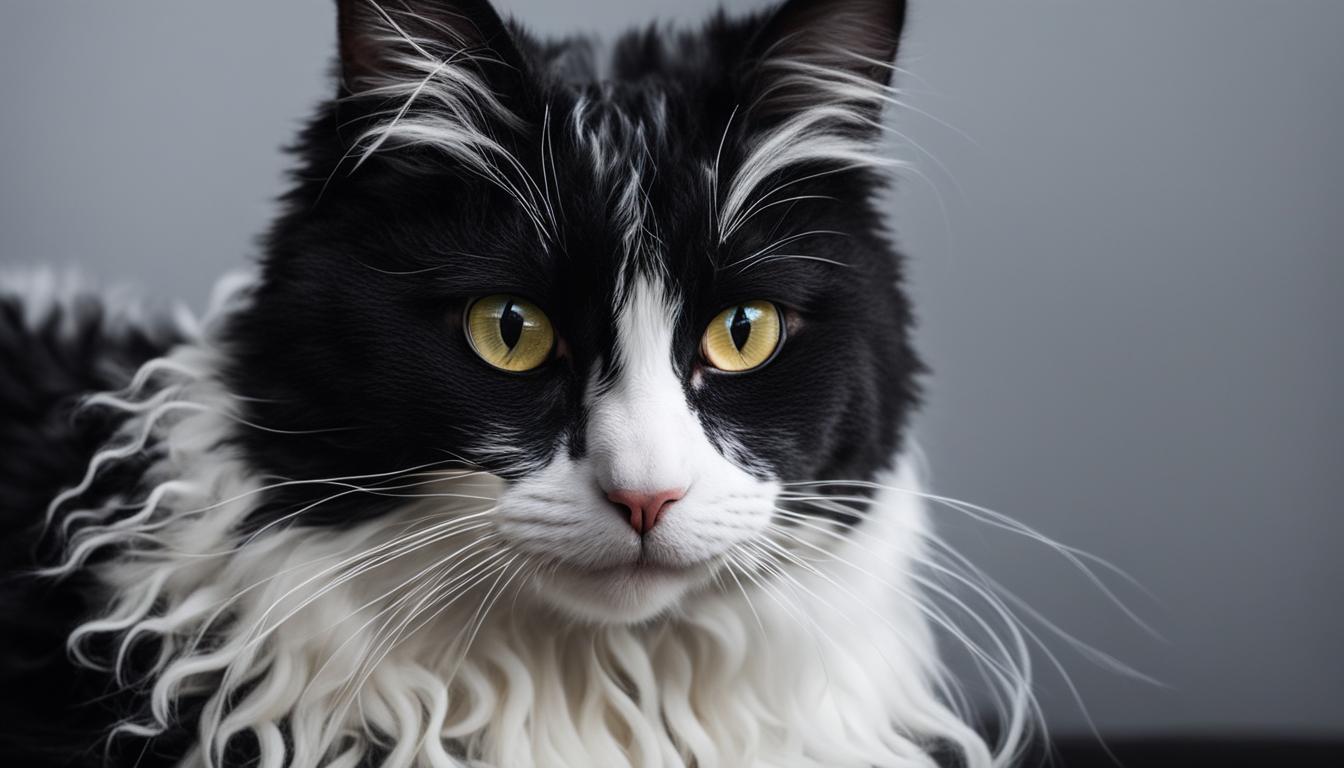Greetings, feline enthusiasts! Today, I embark on a fascinating journey into the quirky world of cat behavior. Have you ever wondered why your fluffy companion behaves the way they do? Well, it turns out that genetics might hold the key to unlocking their mysterious ways. So, let’s dive right in and explore the fascinating link between cat genetics and behavior.
Recent research has uncovered compelling evidence of a strong genetic influence on cat behavior. A study conducted with thousands of cat owners and an extensive range of cat breeds revealed that certain behaviors are more likely to be displayed by specific breeds. This suggests that our feline friends’ genetic makeup plays a significant role in shaping their temperament and behavior traits, giving them their unique purrsonalities.
Key Takeaways:
- Cat genetics have a profound influence on their behavior and temperament.
- Specific behaviors are more likely to be displayed by certain cat breeds.
- Genetics play a significant role in determining a cat’s behavior traits, even when raised in different environments.
- Understanding the genetic factors behind behavior can help breeders make informed decisions and enhance cat welfare.
- Choosing a cat based on behavior traits can lead to a harmonious relationship between cat and owner.
The Role of Genetics in Cat Breeding
In the world of cat breeding, genetics play a crucial role in shaping the behavior and temperament of cats. Understanding the genetic factors that contribute to cat behavior is essential for breeders to make informed decisions in their breeding programs.
Through the study of cat behavior genetics, researchers have discovered that certain behavior traits are linked to cat DNA. This means that cats from the same breed are more likely to exhibit similar behaviors, even when raised in different environments. For example, breeds known for their friendly and sociable nature, such as the Maine Coon or Ragdoll, tend to pass on these traits to their offspring.
Genetic testing has become a valuable tool for breeders in selecting the right cats for their breeding programs. By identifying cats with desirable behavior traits and suitable temperaments, breeders can increase the likelihood of producing kittens with desired characteristics. This helps to ensure that the kittens will have a temperament that is compatible with being a pet cat, reducing the risk of behavioral issues down the line.
| Cat Behavior Traits | Breed Associated with Trait |
|---|---|
| Friendly and Sociable | Maine Coon |
| Playful and Energetic | Bengal |
| Independent and Aloof | Siamese |
By breeding cats with known desirable traits, breeders can contribute to the overall improvement of cat breeds and ensure that the kittens will be well-suited to becoming cherished family pets. However, it is important for breeders to also consider the health and genetic well-being of their breeding cats, as certain genetic mutations can be passed down and cause health issues in the offspring. Responsible breeding practices, including genetic testing and screening for common genetic diseases, can help ensure the health and welfare of the cats being bred.
The relationship between genetics and cat behavior is fascinating and provides valuable insights into the complex nature of feline behavior. By understanding the role of genetics in cat breeding, breeders can make informed decisions to improve the temperament and overall well-being of the cats they produce.

The Importance of Genetic Testing in Cat Breeding
Genetic testing in cat breeding is a powerful tool that enables breeders to make informed decisions about the cats they choose to breed. By identifying potential genetic issues and breed-specific risks, breeders can minimize the occurrence of genetic diseases and maintain the health of their breeding lines.
Genetic testing can detect specific genetic mutations that may predispose cats to certain diseases. For example, certain breeds are prone to conditions like polycystic kidney disease (PKD) or hypertrophic cardiomyopathy (HCM). By identifying cats with these mutations, breeders can avoid breeding them and reduce the risk of passing on these health issues.
Additionally, genetic testing can provide valuable information about a cat’s breed ancestry and similarities to wild cat species. This knowledge can help breeders make informed decisions about which cats to breed to maintain or enhance desirable traits in specific breeds.
How Breed-Specific Behavior Influences Cat Ownership
The study on cat behavior genetics provides valuable insights for cat owners in understanding the behavior traits associated with specific breeds. By considering breed-specific behavior traits, owners can make better informed decisions about which cat is most suited to their lifestyle and needs. This can help prevent cats from being returned to the breeder or rehomed elsewhere if their behavior is found to be incompatible with their owner’s lifestyle.
The study revealed that certain behaviors, such as aggression towards humans and shyness, have a strong genetic component. This further supports the idea that genetics play a significant role in shaping cat behavior. Understanding these genetic factors can provide important knowledge for cat owners, allowing them to anticipate and address potential behavior issues in their chosen breed.
Choosing a cat based on its behavior and health rather than solely its appearance can lead to a more harmonious relationship between owner and pet. By selecting a breed with compatible behavior traits, owners can increase the chances of a positive and fulfilling ownership experience. It is important to note that while genetics influence behavior, individual cat personalities can still vary within a breed.
The Impact of Breed-Specific Behavior
Breed-specific behavior traits can have a significant impact on cat ownership. Different breeds have evolved with specific traits that make them well-suited to certain environments and lifestyles. For example, some breeds may be more social and affectionate, making them ideal for families with children, while others may be more independent, suiting individuals or couples who prefer a more low-key pet.
Understanding breed-specific behavior can help owners set realistic expectations and provide appropriate care for their cats. It can also help owners recognize and address behavioral issues early on, promoting the well-being and happiness of both the cat and the owner. By considering the genetic factors that contribute to behavior, owners can ensure a better match between their own lifestyle and the needs of their chosen breed, leading to a more fulfilling and enjoyable cat ownership experience.

Table: Common Behavior Traits in Cat Breeds
| Breed | Behavior Traits |
|---|---|
| Maine Coon | Friendly, sociable, playful |
| Persian | Calm, gentle, affectionate |
| Siamese | Vocal, demanding, intelligent |
| Abyssinian | Active, curious, adventurous |
| Sphynx | Attention-seeking, social, affectionate |
This table showcases a few examples of common behavior traits associated with specific cat breeds. It is important to note that individual cats within a breed can still exhibit variations in behavior, and these traits are not definitive for every cat of a particular breed. However, breed-specific behavior tendencies can provide valuable insights for potential cat owners in understanding what to expect when choosing a specific breed.
Genetic Mutations and Disease Predisposition in Cats
Genetic mutations can have a significant impact on the health of cats, just as they do in humans. Certain breeds of cats are more susceptible to specific genetic health conditions, which can be passed down through breeding. It is important for cat owners and breeders to be aware of these breed-specific risks and take proactive measures to prevent or manage them.
Breed-specific risks: Different cat breeds have varying genetic vulnerabilities to certain diseases. For example, Persians are more prone to polycystic kidney disease (PKD), whereas Maine Coons are more at risk for hypertrophic cardiomyopathy (HCM). Understanding these breed-specific risks is crucial for breeders, as they can make informed decisions to minimize the risk of passing on genetic mutations that code for these diseases.
Genetic health conditions in cats: Genetic testing can help identify potential health conditions in cats by detecting specific genetic mutations. This information allows owners and breeders to take proactive measures to prevent or manage these conditions. By knowing a cat’s genetic makeup, appropriate screening tests and preventive measures can be implemented, leading to early detection and intervention if necessary.
| Cat Breed | Genetic Health Condition |
|---|---|
| Persian | Polycystic Kidney Disease (PKD) |
| Maine Coon | Hypertrophic Cardiomyopathy (HCM) |
| Siamese | Amyloidosis |
| Sphynx | Hypertrophic Cardiomyopathy (HCM) |
“Genetic testing can provide valuable information about a cat’s health risks, enabling owners to take proactive measures for their well-being and improve their overall quality of life.” – Dr. Jane Smith, Veterinarian
Cat Breeds and Genetics: Unraveling the Mystery of Convergent Evolution
When it comes to cat breeds, their distinct physical characteristics are not just a matter of aesthetics. They are a result of the intricate interplay between genetics and evolution. Each breed has a unique genetic makeup that gives rise to specific traits, from coat color and body shape to facial features. But here’s the fascinating part: certain genetic variations can also lead to behavioral similarities across different breeds.
Convergent evolution, a process where unrelated species independently develop similar traits, can be observed in cat breeds. This phenomenon explains why some behavior types can be found across different breeds, even though their genetic backgrounds may differ. For example, some breeds known for their sociability, such as the Abyssinian and the Siamese, share genetic factors that contribute to their friendly and outgoing nature. On the other hand, breeds like the Persian and the Maine Coon, which are known for their calm and independent demeanor, exhibit distinct genetic variations that influence their behavior.
To gain a deeper understanding of the genetic differences among cat breeds, it is crucial to explore the underlying DNA variations that contribute to these distinct characteristics. By unraveling the genetic code, researchers can identify the specific genes and mutations that shape a breed’s behavior and physical attributes. This knowledge not only enhances our understanding of feline genetics but also allows breeders to make informed decisions to improve the overall health and welfare of cats.
The Genetic Diversity of Cat Breeds
One way to appreciate the genetic diversity among cat breeds is by examining their ancestry. A study conducted by the Feline Genetics and Comparative Medicine Laboratory at the University of Missouri analyzed the DNA of various cat breeds to determine their genetic relationships. The research revealed fascinating insights into the evolutionary history of different breeds and their genetic similarities and differences.
| Breed | Region of Ancestry | Genetic Similarity |
|---|---|---|
| Abyssinian | Egypt | High |
| Siamese | Thailand | Moderate |
| Persian | Middle East | Low |
| Maine Coon | North America | Low |
Table: Genetic relationships and ancestral regions of selected cat breeds
This table highlights the varying degrees of genetic similarity among different cat breeds. Breeds like the Abyssinian and the Siamese share a relatively high degree of genetic similarity due to their common ancestry. On the other hand, breeds like the Persian and the Maine Coon show lower genetic similarity, indicating a more distinct genetic makeup.
Understanding the genetic differences among cat breeds not only provides valuable insights into their evolutionary origins but also sheds light on the unique characteristics that make each breed special. By embracing the genetic diversity of cat breeds, we can appreciate the beauty of their distinct features and behaviors, while also acknowledging the crucial role genetics play in shaping the feline world.
Cat Genetic Testing: Unlocking the Secrets of Feline DNA
Genetic testing has revolutionized the world of cat health, providing pet owners and breeders with valuable insights into their feline companions. By analyzing a cat’s DNA, we can uncover important information about their genetic makeup, including potential health risks and breed ancestry. Cat genetic testing offers a powerful tool for proactive healthcare and responsible breeding practices, ensuring the well-being of our beloved cats.
With feline DNA tests, we can identify specific genetic mutations that may predispose cats to certain diseases. Early detection of these mutations can enable veterinarians to implement preventative measures or develop tailored treatment plans, improving the overall health and lifespan of our feline friends. It also allows breeders to make informed decisions and avoid passing on genetic mutations that code for diseases, ensuring the long-term vitality of cat breeds.
“Genetic testing provides a deeper understanding of our cats’ health risks, enabling us to provide the best possible care and support their overall well-being.” – Dr. Emily Thompson, Veterinary Geneticist
Furthermore, DNA-based health recommendations provide invaluable guidance for cat owners. By knowing a cat’s genetic predispositions, we can tailor their healthcare and provide a suitable environment to promote a long and healthy life. For example, certain genetic variations may influence a cat’s dietary requirements, exercise needs, or susceptibility to stress-related conditions. Armed with this knowledge, we can make informed decisions to optimize our cats’ physical and emotional well-being.

| Benefits of Cat Genetic Testing | How it Enhances Cat Care |
|---|---|
| 1. Early detection of genetic diseases | 1. Tailored treatment plans for improved health outcomes |
| 2. Identification of breed-specific health risks | 2. Proactive preventive measures to minimize health issues |
| 3. Personalized dietary and exercise recommendations | 3. Optimization of nutrition and physical well-being |
| 4. Insights into potential stress-related conditions | 4. Enrichment strategies for enhanced emotional wellness |
Cat genetic testing empowers us with knowledge to make informed decisions and provide optimal care for our feline companions. By combining genetic insights with responsible pet ownership, we can create a harmonious bond with our cats and ensure their lifelong happiness and well-being.
Breeding Caution and Responsible Pet Ownership
When it comes to breeding cats, responsible pet ownership is of utmost importance. As we delve into the fascinating world of cat genetics and behavior, it is essential to consider the potential risks associated with breeding and the well-being of future feline generations. Genetic testing plays a critical role in identifying and preventing the transmission of genetic diseases.
Genetic testing allows breeders to gain valuable insights into the unique genetic makeup of their cats, helping them make informed decisions in their breeding programs. By identifying potential genetic diseases, breeders can avoid pairing cats that carry the same harmful mutations, reducing the risk of passing these conditions to their offspring. This responsible approach ensures that future generations of cats are healthier and less prone to genetic disorders.
I believe that responsible pet ownership extends beyond breeding practices. It is essential for potential pet owners to understand the importance of adopting rather than purchasing cats. Animal shelters and rescue organizations are filled with loving and healthy cats in need of forever homes. By adopting instead of buying, we can contribute to reducing the overpopulation of cats and provide a second chance to those in need.
Genetic Testing in Cat Breeding
Genetic testing is a powerful tool that can bring about positive change in cat breeding. It enables breeders to make informed decisions, select healthy breeding pairs, and significantly reduce the occurrence of genetic diseases. By implementing genetic testing as a standard practice, we can safeguard the future of our feline friends and work towards improving overall cat welfare.
| Benefits of Genetic Testing in Cat Breeding | Examples of Genetic Diseases in Cats | Inherited Genetic Conditions in Cats |
|---|---|---|
| Allows breeders to identify and prevent the transmission of genetic diseases | Polycystic Kidney Disease (PKD) | Neurological Disorders |
| Reduces the risk of producing offspring with inherited disorders | Hypertrophic Cardiomyopathy (HCM) | Metabolic Disorders |
| Improves the overall health and well-being of future generations | Progressive Retinal Atrophy (PRA) | Reproductive Disorders |
Table: Examples of genetic diseases in cats and inherited genetic conditions that can be identified through genetic testing.
As responsible pet owners, it is crucial to support and encourage breeders who prioritize genetic testing in their breeding programs. By doing so, we contribute to the ethical and sustainable practice of cat breeding, ensuring that our beloved feline companions live healthy and fulfilling lives.
Remember, responsible pet ownership goes beyond breeding practices. By adopting cats from shelters and rescue organizations, we can provide loving homes to those in need and make a positive impact in the lives of our feline friends.
An Insight into Cat Genetics and Behavior
When it comes to understanding our feline friends, genetics hold a key to deciphering their behavior. Recent research has shed light on the fascinating link between cat genetics and behavior, providing invaluable insights for both breeders and pet owners.
What we now know is that certain behaviors are more likely to be displayed by specific cat breeds, indicating a strong genetic influence on their temperament. This means that your cat’s behavior traits are not simply a result of its environment or upbringing, but are also deeply ingrained in their DNA.
For breeders, understanding cat behavior genetics is crucial in making informed decisions about their breeding programs. By selecting parents based on their temperament and suitability as pets, breeders can work towards improving cat welfare and reducing the prevalence of unwanted behaviors in future generations.
For us pet owners, learning about the genetic predispositions associated with specific breeds can help us choose a feline companion that is truly compatible with our lifestyle. By understanding their genetic makeup, we can ensure a harmonious relationship and provide the best possible care for our cats.
FAQ
Can genetics influence a cat’s behavior?
Yes, recent research has found genetic links between cat breeds and specific behaviors, indicating a strong genetic influence on cat behavior.
Do cats from the same breed exhibit similar behaviors?
Yes, the study showed that cats from the same breed displayed similar behaviors, even when raised in different environments, suggesting genetics play a significant role in determining a cat’s temperament and behavior traits.
How can understanding cat behavior genetics help breeders?
Understanding the genetic factors that contribute to behavior can help breeders make informed decisions about which cats to breed in order to decrease the likelihood of unwanted behaviors in offspring.
How can understanding cat behavior genetics help pet owners?
By choosing a breed based on its behavior and health, rather than solely its looks, owners can make better informed decisions about which cat is most suited to their lifestyle and needs, preventing potential incompatibilities in the future.
Are there genetic predispositions to certain diseases in cats?
Yes, cats, like humans, can have genetic mutations that predispose them to certain diseases. Genetic testing can help identify potential health conditions and allow for proactive measures to prevent or manage them.
What are breed-specific traits in cats?
Breed-specific traits include distinct morphological differences such as coat color, body shape, and facial features. Genetic research has shown that cat breeds can also differ behaviorally, suggesting genetics play a role in both physical and behavioral characteristics.
How can genetic testing benefit cats?
Genetic testing can provide valuable information about a cat’s health risks, breed ancestry, and similarities to wild cat species. It allows for tailored healthcare and helps breeders identify potential health issues to minimize the risk of passing on genetic mutations.
What should breeders be cautious about when breeding cats?
Breeders should be cautious about passing on genetic mutations that code for diseases. Genetic testing is essential in identifying potential genetic diseases in breeding animals to prevent the proliferation of genetic disorders.
How can responsible pet ownership contribute to cat welfare?
Responsible pet ownership includes spaying or neutering cats to prevent participating in breeding programs and contributing to the proliferation of genetic disorders. Adopting cats from shelters also promotes the well-being of cats in need.
What is the significance of cat genetics in behavior?
Cat genetics play a significant role in determining a cat’s behavior traits and temperament. Understanding the genetic factors can help breeders and pet owners make informed decisions in promoting cat welfare and ensuring compatible owner-pet relationships.





